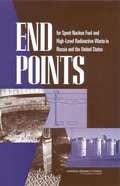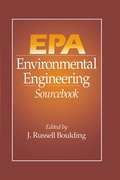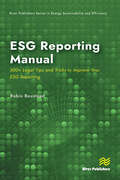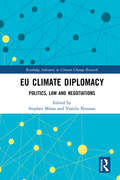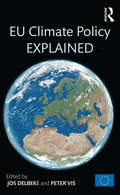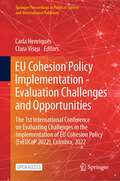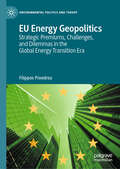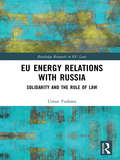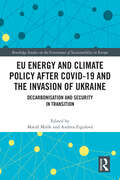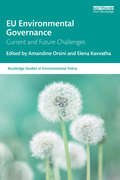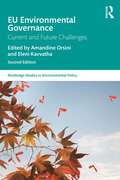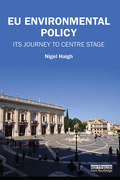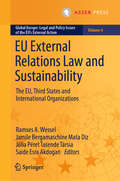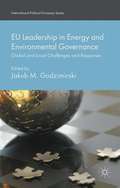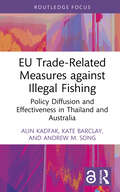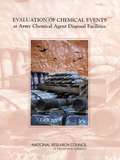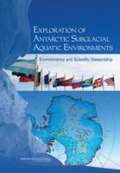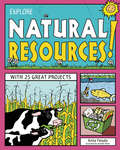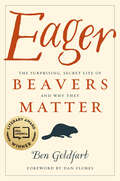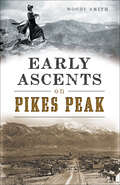- Table View
- List View
ECONOMIA 3D (EBOOK)
by Martin LousteauLa economía te resulta aburrida, ajena, difícil y sin alma? No desesperes. También puede hacerte reír, aprender y hasta darte un poco de esperanza. Para eso no hace falta ponerse solemnes: alcanza con redescubrir con nuevos ojos sus enseñanzas más valiosas. En estas páginas, Martín Lousteau se mueve como un guía experto entre los tópicos más diversos e inesperados. El rol de los bancos y del sistema financiero, los esquemas mentales inconscientes que orientan nuestras decisiones, el desarrollo, la relación entre el dinero y la felicidad, la economía del sexo y del deporte, el consumo desorientado, la desigualdad, la crisis argentina y la debacle mundial, la ecología y el cambio climático son algunas de las estaciones de este recorrido repleto de realidad, humor y conocimiento.
EHI02 Paryavaran aur Anukulan Ka Aarambhik Svaroop - IGNOU
by IgnouThis units is divided into 4 chapters. It begins with how human had coordination with nature. Next chapters analysis the causes due to which some areas grew rapidly. In third and 4th chapter reader will get to know how cultural development took place in Indian sub continent.
END POINTS for Spent Nuclear Fuel and High-Level Radioactive Waste in Russia and the United States
by Committee on End Points for Spent Nuclear Fuel High-Level Radioactive Waste in Russia the United StatesEnd Points for spent Nuclear Fuel and High-Level Radioactive Waste in Russian and the United Statesprovides an analysis of the management of spent nuclear fuel and high-level radioactive waste in Russia and the United States, describing inventories, comparing approaches, and assessing the end-point options for storage and disposal of materials and wastes. The authoring committee finds that despite differences in philosophy about nuclear fuel cycles, Russia and the United States need similar kinds of facilities and face similar challenges, although in Russia many of the problems are worse and funding is less available. This book contains recommendations for immediate and near-term actions, for example, protecting and stabilizing materials that are security and safety hazards, actions for the longer term, such as developing more interim storage capacity and studying effects of deep injection, and areas for collaboration.
EPA Environmental Engineering Sourcebook
by J. Russell BouldingThe U.S. Environmental Protection Agency (U.S. EPA) publishes several series of documents that provide up-to-date information about environmental site assessment and remediation. The EPA Environmental Engineering Sourcebook includes papers and bulletins that focus on remediation of soil and groundwater, making them available in a convenient form.This book compiles thirty-five documents- written by recognized leaders - on major methods and promising new techniques for hazardous waste treatment and site remediation. Each chapter evaluates the type of contaminant and site characteristics needed to select a technology for use at hazardous waste sites.The EPA Environmental Engineering Sourcebook presents EPA documents in an easy-to-use, concise format. It contains numerous graphs, charts and figures that make it an important resource for those involved in environmental protection, site remediation, and site assessment. FeaturesContains chapters written by recognized leadersExamines major methods as well as assesses new techniques for hazardous waste treatment and site remediationPresents information in an easy-to-use, concise formatEvaluates each type of contaminant and site characteristics for selecting technology at hazardous waste sites
ESG Reporting Manual: 500+ Legal Tips and Tricks to Improve Your ESG Reporting (River Publishers Series in Energy Sustainability and Efficiency)
by Robin BousteadAre you struggling to navigate the complex landscape of ESG compliance? Do you fear falling victim to allegations of green or social-washing while also striving to deliver value for your shareholders? Look no further. Our ESG Reporting Manual offers 500+ legal tips and tricks, presented in a practical step-by-step format, to help your organization meet its reporting obligations and achieve success. Written by a seasoned business owner with decades of experience, this manual is your ultimate guide to navigating the complexities of ESG legislation with confidence. Don't let confusion hold you back any longer – let our manual guide you towards compliance and growth.
EU Climate Diplomacy: Politics, Law and Negotiations (Routledge Advances in Climate Change Research)
by Stephen Minas and Vassilis NtousasThe European Union has long played a leadership role in the global response to climate change, including the development and dissemination of climate-friendly technologies such as renewable energy. EU diplomacy has been a vital contributor to the development of international cooperation on climate change through the agreement of the United Nations Climate Convention, its Kyoto Protocol and, most recently, the Paris Agreement. In addition, the election of Donald Trump as President of the United States means that the EU contribution to climate diplomacy will become more important still, both in filling the leadership gap (together with other major economies) and in responding to any sabotage by the Trump administration. This book will extend knowledge of the EU as a key actor in climate diplomacy by bringing together leading practitioners and researchers in this field to take stock of the EU’s current role and emerging issues. Contributions will be grouped into three strands: 1) the interplay between EU climate diplomacy and internal EU politics; 2) how the EU’s legal order is a factor that determines, enables and constrains its climate diplomacy; and 3) the EU’s contribution to diplomacy concerning climate technology both under the Climate Convention and more broadly. Collectively, these contributions will chart the EU’s role at a critical time of transition and uncertainty in the international response to climate change. EU Climate Diplomacy: Politics, Law and Negotiations will be of great relevance to students, scholars and policymakers with an interest in international climate politics and policy, transnational environmental law and politics and EU studies more generally.
EU Climate Policy Explained
by Jos Delbeke Peter VisThe EU has been the region of the world where the most climate policies have been implemented, and where practical policy experimentation in the field of the environment and climate change has been taking place at a rapid pace over the last twenty-five years. This has led to considerable success in reducing pollution, decoupling emissions from economic growth and fostering global technological leadership. <P><P>The objective of the book is to explain the EU's climate policies in an accessible way, to demonstrate the step-by-step approach that has been used to develop these policies, and the ways in which they have been tested and further improved in the light of experience. The book shows that there is no single policy instrument that can bring down greenhouse gas emissions, but the challenge has been to put a jigsaw of policy instruments together that is coherent, delivers emissions reductions, and is cost-effective. The book differs from existing books by the fact it covers the EU's emissions trading system, the energy sector and other economic sectors, including their development in the context of international climate policy. <P><P>Set against the backdrop of the 2015 UN Climate Change conference in Paris, this accessible book will be of great relevance to students, scholars and policy makers alike.
EU Cohesion Policy Implementation - Evaluation Challenges and Opportunities: The 1st International Conference on Evaluating Challenges in the Implementation of EU Cohesion Policy (EvEUCoP 2022), Coimbra, 2022 (Springer Proceedings in Political Science and International Relations)
by Carla Henriques Clara ViseuThis open access book is the result of the 1st International Conference on Evaluating Challenges in the Implementation of EU Cohesion Policy (EvEUCoP 2022). It presents the recent findings, sparks discussion, and reveals new research paths addressing the use of novel methodologies and approaches to tackle the challenges and opportunities that are unveiled with the implementation of the EU cohesion policy. The authors cover a wide range of topics including the monitoring of data; the clearness of indicators in measuring the impact of interventions; novel evaluation methods, addressing the mid-term and terminal assessment; as well as case studies and applications on evaluations of the thematic objectives under the scrutiny of the cohesion policy, namely:• Research, technological development, and innovation; • Information and communication technologies;• Shift toward a low-carbon economy.During the 2014-2020 programmatic period, member states were required to undertake assessments to evaluate the efficacy, efficiency, and impact of each operational program. Such evaluations are generally concerned with the compliance of projects and activities with programmatic priorities, as well as with funds' absorption capacity and refer to ex-ante and ex-post assessments. Hence, this book proposes the use of novel methodologies addressing the mid-term and terminal assessments that enable performing the efficiency appraisal of the operational programs and that can support decision-makers in the selection of projects that should be awarded for funding.
EU Energy Geopolitics: Strategic Premiums, Challenges, and Dilemmas in the Global Energy Transition Era (Environmental Politics and Theory)
by Filippos ProedrouThe global energy transition will be a game-changer for global politics. The field of energy geopolitics hence is changing fast, providing challenges, opportunities and variable outcomes for states across the world. The academic scholarship on the geopolitics of renewables has expanded exponentially over the last decade focusing on winners vs losers, conflict vs cooperation and establishing initial expectations and general propositions regarding the outcomes of the global energy transition. Cases studies, however, have been far and few, and appear in book chapters or, more rarely, journal articles. Overall, there is a dearth of academic monographs examining in depth how specific actors in the global system approach new energy geopolitics, how they are impacted by the global energy transition, and how this links with their grand strategy. This short monograph aims to fill this gap by offering an up-to-date case study of EU energy geopolitics. Grounded upon the sub-field of energy geopolitics, it produces a conceptual framework linking the global energy transition with EU grand strategy to assess how it impacts EU’s position in the global system, as well as the strategic gains, trade-offs and risks implicated. The book takes as its starting point and reviews systematically the main assumptions of the geopolitics of the global energy transition literature and the EU energy and climate policy that drives and shapes the EU energy transition. It subsequently focuses its attention on the impact of the EU energy transition on EU energy security, economic competitiveness and foreign policy/ power position and the potential it generates for more conflict or cooperation. The discussion is anchored in the different forms of power the EU operationalizes and showcases the strengths, limits and antinomies of the EU power toolbox in EU energy geopolitics. The originality, significance and contribution of this monograph lies in the cross-fertilization of fossil divestment and clean energy geopolitics, energy and climate policy, energy transition and EU as a power scholarship, with an eye to provide a comprehensive, up-to-date account of new EU energy geopolitics. In all, this monograph dissects the prospects and geopolitical implications of the new energy geopolitics, and the foreign policy ramifications engendered by the global energy transition. This book is aimed at academics and students in the areas of International Relations, International Political Economy, European Studies, Geopolitics, and Energy Politics. It aspires, moreover, to become a reference point for the scholarship in the field of energy (geo)politics. Moreover, it will be of value to think-tanks and policy-makers working in the fields of foreign, energy and climate policy.
EU Energy Relations With Russia: Solidarity and the Rule of Law (Routledge Research in EU Law)
by Umut TurksenThis book provides a detailed analysis of the legal framework in which the energy trade between the European Union and the Russian Federation has been conducted. Using case studies of eight member states, it critically examines the EU’s ability and the duty of its Member States to conduct their external energy trade in accordance with the principle of solidarity. Providing a comprehensive analysis of the principle of solidarity as provided in the acquis communautaire of the EU, the book critically analyses the legal framework pertaining to EU-Russia energy trade to ascertain whether, and to what extent, it satisfies the requirements of the rule of law.
EU Energy and Climate Policy after COVID-19 and the Invasion of Ukraine: Decarbonisation and Security in Transition (Routledge Studies on the Governance of Sustainability in Europe)
by Mišík, Edited by MatúšThis book discusses the impact of the COVID-19 pandemic and the Russian invasion of Ukraine on the European Union’s climate and energy policy.By examining the positions of the various actors involved, the book analyses whether the COVID-19 pandemic and the Russian invasion of Ukraine has contributed to greater unity, decarbonisation, and security of energy supply, and if not, whether these crises prompted member states to turn inwards and opt for national solutions to climate and energy challenges. It thus provides a new outlook for EU energy policy in relation to the experience of the two crises.This book will be of key interest to scholars, students and practitioners of climate and energy policy, energy security, EU policy, and more broadly to energy politics, European integration and European Union governance.
EU Environmental Governance: Current and Future Challenges (Routledge Studies in Environmental Policy)
by Amandine Orsini Elena KavvathaThis book presents an overview of the field of environmental law and policies within the European Union, from theoretical foundations to major issues and applied governance solutions. Drawing on expertise from renowned academics and practitioners from different disciplines, EU Environmental Governance: Current and Future Challenges helps readers to understand the main legal, political and economic issues of environmental protection since the adoption of the Paris Agreement by the European Union in 2015, until the 2020 Brexit, European Green Deal and coronavirus outbreak. The authors examine a broad range of sensitive and topical environmental issues including climate change, air pollution, waste management and circular economy, nuclear waste, biodiversity, agriculture, chemicals, nanotechnology, the environmental impacts of trade and environmental conflicts, presenting both current insights and future challenges. Overall, this volume exposes the reader to a vast array of empirical case studies, which will bolster their training and help tackle the environmental challenges faced by Europe today. This book is a valuable resource for students, researchers and policymakers across a broad range of fields, including environmental law and policies, environmental economics, climate science and environmental sociology.
EU Environmental Governance: Current and Future Challenges (Routledge Studies in Environmental Policy)
by Amandine Orsini Eleni KavvathaThis book presents an overview of the field of environmental law and policies within the European Union (EU) and externally, from theoretical foundations to major issues and applied governance solutions.Drawing on expertise from renowned academics and practitioners from different disciplines, EU Environmental Governance: Current and Future Challenges helps readers to understand the main legal, political and economic issues of environmental protection since the adoption of the European Green Deal in 2019. This new edition presents both current insights and future challenges as they seem to be emerging in the new geopolitical era in the EU after major events such as the COVID‑19 pandemic and the Russian invasion in Ukraine. The authors examine a broad range of sensitive and topical environmental challenges including climate change, air and environmental pollution, waste management, biodiversity protection, environmental and human health, marine biodiversity, renewable energy, nuclear energy and sustainable Arctic governance. Overall, this volume exposes the reader to a vast array of empirical case studies, which will bolster their training and help tackle the environmental challenges faced by Europe today.This book is a valuable resource for students, researchers and policymakers across a broad range of fields, including environmental law and policies, environmental economics, climate science and environmental sociology.
EU Environmental Policy: Its journey to centre stage
by Nigel HaighAt a time when Europeans across the continent are focused on the EU's future direction, this book provides an important contribution to the current debate. Created for reasons quite unconnected with the environment, the EU has been given a compelling new justification by the success of its environmental policy. A number of factors – including a number of threats that came to prominence in the 1980s, and the new concept of 'sustainable development' – are responsible for pushing environmental policy to the forefront of its agenda. Nigel Haigh, a leading authority on the development and implementation of EU environmental policy, traces its evolution from obscurity to centrality. Drawing on a range of articles and lectures, he demonstrates how the EU has not only adapted itself to take on entirely new subject matter, but also has contributed to solving problems which individual Member States could not have dealt with on their own. The book goes on to contextualise the issues throughout its history and offers insight into the future role of the EU in environmental matters. This book is a valuable resource for academics and scholars as well as professionals and policy makers in the areas of environment and sustainability, politics, international relations and European affairs.
EU External Relations Law and Sustainability: The EU, Third States and International Organizations (Global Europe: Legal and Policy Issues of the EU’s External Action #4)
by Ramses A. Wessel Jamile Bergamaschine Mata Diz Júlia Péret Tasende Társia Saide Esra AkdoganThis book delves into the integration of sustainability within the European Union’s external activities, emphasizing the necessity to weave 'sustainability' throughout its relations with third states and international organizations. Unique in its approach, this collective work brings together a diverse range of experts, each contributing a chapter that explores different facets of sustainability in the context of the EU’s increasing external actions. The pressing demands for sustainable development, as outlined in the EU Treaties—specifically Articles 3(5) and 21 of the TEU and Articles 11 and 191 of the TFEU—are examined through a compilation of theoretical analyses, legal dogmatic approaches, and detailed case studies. These contributions aim to offer a cohesive understanding of the legal implications and strategies for embedding sustainability into the EU’s external engagements, providing a multidisciplinary perspective on a critical global issue. Furthermore, the book critically examines how sustainability is operationalized within various EU external policies, providing readers with a deep dive into the mechanisms and outcomes of such integration. It addresses the challenges and opportunities that lie ahead for the EU in maintaining its commitment to sustainability, making it a timely contribution to the discourse on global environmental policy and governance. Designed for scholars, legal practitioners, policymakers, and students interested in European Union law, sustainability, and external relations, this collective work serves as an essential resource. It offers a nuanced perspective on the complexities of legal frameworks that govern the EU’s sustainable external actions and their significant impact on global environmental governance. Ramses A. Wessel is a Professor of European Law at the Faculty of Law of the University of Groningen. Jamile B. Mata Diz is a Professor of International Public Law and Coordinator of the Jean Monnet Center of Excellence of the Federal University of Minas Gerais. Júlia Péret T. Társia is a PhD Candidate at the Federal University of Minas Gerais. Saide Esra Akdogan is a lecturer and researcher at Wageningen University and Research.
EU Leadership in Energy and Environmental Governance: Global And Local Challenges And Responses (International Political Economy Series)
by Jakub M. GodzimirskiThis edited collection focuses on the impact of the changing global distribution of power on the EU's energy policy and ability to project its approach to energy-related issues abroad. It maps the EU's changing position on global energy, the impact of various factors on its energy policy, and its relations with Russia, China, the USA and Brazil.
EU Trade-Related Measures against Illegal Fishing: Policy Diffusion and Effectiveness in Thailand and Australia (Routledge Focus on Environment and Sustainability)
by Kate Barclay Andrew M. Song Alin KadfakFocusing on the experiences of Thailand and Australia, this book examines the impact of trade-restrictive measures as related to the EU’s regulations to prevent Illegal, Unreported and Unregulated (IUU) fishing. It is widely accepted that IUU fishing is harmful, and should be stopped, but there are different approaches to tackling it. Acknowledging this, this book argues that major efforts to fight IUU fishing require careful analyses if the goal is to achieve optimal results and avoid unintended consequences. The book draws on the recent experiences of Thailand and Australia to offer an empirical examination of one increasingly prominent solution, trade-restrictive measures. With Thailand representing direct, active intervention by the EU and Australia a more indirect dispersion of policy narratives and discourses, the book provides a rounded view on how likely it is that different countries in different situations will adapt to the changing policy norms regarding IUU fishing. Understanding the reactions of countries who might be targeted, or otherwise be influenced by the policy, generates new knowledge that helps inform a more effective and scalable implementation of the policy on the part of the EU and a better governance preparedness on the part of non-EU fishing nations. In broader terms, this book exposes a key moment of change in the compatibility between environmental regulations and international trade. The EU IUU policy is a prime example of a policy that uses the mechanisms of international trade to account for environmental and conservation objectives. By way of the unilateral and trade-restrictive stance against IUU fishing, the EU has positioned itself as a major market and normative power, driving its sustainability norms outwards. This book sheds light on the efficacy of this policy setup based on the analysis of country perspectives, which is a key factor influencing its potential spread. This book will be of interest to students and scholars of international fisheries politics, marine conservation, environmental policy and international trade, and will also be of interest to policymakers working in these areas.
EVALUATION OF CHEMICAL EVENTS at Army Chemical Agent Disposal Facilities
by Committee on Evaluation of Chemical Events at Army Chemical Agent Disposal FacilitiesFor over a decade the Army has been carrying out a program aimed at the destruction of accumulated chemical weapons stored at several sites. While destruction by incineration has been successful, several incidents -- called chemical events -- occurred during the disposal process or decontamination activities that raised some public concerns about the safety of operations of three third generation incineration facilities. As a result, the Congress asked the NRC to investigate whether the incidents provide information useful to help ensure safe operation of the future sites. This book presents an analysis of causes of and responses to past chemical events, implications of such events for ongoing and future demilitarization activities, and recommendations for preparing for future events.
EXPLORATION OF ANTARCTIC SUBGLACIAL AQUATIC ENVIRONMENTS: Environmental and Scientific Stewardship
by National Research Council of the National AcademiesAntarctica is renowned for its extreme cold; yet surprisingly, radar measurements have revealed a vast network of lakes, rivers, and streams several kilometers beneath the Antarctic ice sheet. Sealed from Earth's atmosphere for millions of years, they may provide vital information about microbial evolution, the past climate of the Antarctic, and the formation of ice sheets, among other things. The next stage of exploration requires direct sampling of these aquatic systems. However, if sampling is not done cautiously, the environmental integrity and scientific value of these environments could be compromised. At the request of the National Science Foundation, this National Research Council assesses what is needed to responsibly explore subglacial lakes. Exploration of Antarctic Subglacial Aquatic Environments concludes that it is time for research on subglacial lakes to begin, and this research should be guided by internationally agreed upon protocols. The book suggests an initial protocol, which includes full characterization of the lakes by remote sensing, and minimum standards for biological and other types of contamination.
EXPLORE NATURAL RESOURCES!
by Anita Yasuda Jennifer KellerWhat are natural resources? And why is it important to prevent natural resources from being wasted? Explore Natural Resources! answers these questions. The 25 projects inspire young readers ages 6-9 to have fun while learning why natural resources are important to all living things and how every child can take care of the earth's resources through reducing, reusing, and recycling. Kids will read about national parks and early environmentalists, Earth celebrations, and the science behind renewable and nonrenewable resources. With projects and experiments ranging from making a wind-powered car and creating a solar catcher to calculating their water footprint, children will discover that everything comes from the earth. Projects are easy-to-follow, require little adult supervision, and use commonly found household products, many from the recycling box. Through a mixture of fun facts, trivia, jokes, comics, and hands-on activities, kids will Explore Natural Resources! and gain an appreciation of earth's resources, from its vast oceans to its open skies. Explore Natural Resources! meets common core state standards in language arts for reading informational text and literary nonfiction and is aligned with Next Generation Science Standards. Guided Reading Levels and Lexile measurements indicate grade level and text complexity.
Each One a Furnace: Poems
by Tolu OloruntobaFrom the author of The Junta of Happenstance, here is a brilliant new collection of poems—a burning chronicle of passage and stillness and restlessness.Each One a Furnace explores (im)migration, diasporas, transience, and instability by following the behaviour, and abundant variety, of finches. The often-migratory birds in these poems typify the unrest, and inability to rest, that animate the lives of billions in the modern world. Out of the register of ornithology, themes of difficulty, adversity, and migrancy, urban ennui, and the psychic struggles of diasporic peoples take shape as those unable to be at rest in the world take to improbable flight. Trailing the global mobility of birds, in urban and non-urban settings, in historical and contemporary contexts, and through the metaphysical and concrete, Each One a Furnace is a chronicle of struggle within, and between, cultures.
Each of Us a Universe
by Jeanne Zulick Ferruolo Ndengo Gladys MwileloA heartfelt middle grade from Jeanne Zulick Ferruolo about two girls who go on an adventure to the top of a mountain, and learn about each other, themselves, and the magic friendship can bring, perfect for fans of Katherine Applegate and Barbara O'Connor.What do you do when you’re facing the impossible?Ever since the day when everything changed, Cal Scott’s answer has been to run—run from her mother who’s fighting cancer, run from her father whom she can’t forgive, and run from classmates who’ve never seemed to “get” her anyway. The only thing Cal runs toward is nearby Mt. Meteorite, named for the magical meteorite some say crashed there fifty years ago. Cal spends her afternoons plotting to summit the mountain, so she can find the magic she believes will make the impossible possible and heal her mother. But no one has successfully reached its peak—no one who’s lived to tell about it, anyway.Then Cal meets Rosine Kanambe, a girl who’s faced more impossibles than anyone should have to. Rosine has her own secret plan for the mountain and its magic, and convinces Cal they can summit its peak if they work together. As the girls climb high and dig deep to face the mountain’s challenges, Cal learns from Rosine what real courage looks like, and begins to wonder if the magic she’s been looking for is really the kind she needs.Each of Us a Universe by Jeanne Zulick Ferruolo is a glowing story of friendship, inner strength, and what happens when the impossible becomes possible.
Eager: The Surprising, Secret Life of Beavers and Why They Matter
by Ben GoldfarbWINNER of the 2019 PEN/E.O. Wilson Literary Science Writing AwardAuthor of the New York Times 2023 &“Notable Book&” CrossingsWashington Post &“50 Notable Works of Nonfiction&”Science News &“Favorite Science Books of 2018&”Booklist &“Top Ten Science/Technology Book of 2018&”&“A marvelously humor-laced page-turner about the science of semi-aquatic rodents…. A masterpiece of a treatise on the natural world.&”—The Washington PostIn Eager, environmental journalist Ben Goldfarb reveals that our modern idea of what a healthy landscape looks like and how it functions is wrong, distorted by the fur trade that once trapped out millions of beavers from North America&’s lakes and rivers. The consequences of losing beavers were profound: streams eroded, wetlands dried up, and species from salmon to swans lost vital habitat. Today, a growing coalition of &“Beaver Believers&”—including scientists, ranchers, and passionate citizens—recognizes that ecosystems with beavers are far healthier, for humans and non-humans alike, than those without them. From the Nevada deserts to the Scottish highlands, Believers are now hard at work restoring these industrious rodents to their former haunts. Eager is a powerful story about one of the world&’s most influential species, how North America was colonized, how our landscapes have changed over the centuries, and how beavers can help us fight drought, flooding, wildfire, extinction, and the ravages of climate change. Ultimately, it&’s about how we can learn to coexist, harmoniously and even beneficially, with our fellow travelers on this planet.
Eagle Rock Reservation (Images of America)
by Joseph FaganFounded in 1895, the Essex County Park Commission was the first county park system in the nation. That year, the commission began its management of Eagle Rock. The reservation was designed by renowned architect Frederick Law Olmsted Sr., who also designed Central Park in New York City and the Capitol Grounds in Washington, D.C. Evident characteristics of the architect within the park are the winding roads, natural blended waterways, open fields, and overlooks, all of which combine to attract thousands of visitors each year. Eagle Rock Reservation explores many interesting and little-known facts about the park. Readers are introduced to Llewellyn Haskell, the founder of nearby Llewellyn Park, who first purchased land at Eagle Rock. Seen is the trolley that once served Eagle Rock as it emerged as a popular resort area. Included are the park's view of the New York City skyline and the Hundred Steps to Eagle Rock, the same steps that were ascended by visitors nearly one hundred years ago. Also seen is a never-before-published lab note written by Thomas Edison, documenting World War I experiments he conducted for the U.S. Navy at Eagle Rock.
Early Ascents on Pikes Peak (American Chronicles Ser.)
by Woody SmithAn intriguing, firsthand look at what it was like to ascend the storied Colorado mountain and experience its allure in the early days of the Old West. Magnificent Pikes Peak rises dramatically from the Colorado prairie to a height of 14,114 feet above sea level. Visible for one hundred miles around, the granite giant&’s magnetic appeal compelled rugged mountaineers more than a century ago to risk loose saddles, electrical storms and even murder on treacherous expeditions to the summit. First known as Long Mountain by the Indigenous peoples who sojourned at its hot springs, Pikes Peak was a full-fledged tourist destination by the 1870s. Eager men and women ventured up and down by foot, horse, burro, stagecoach, rail and bicycle. Colorado Mountain Club historian Woody Smith captures the news of the era to recount the thrill of pioneer days on America&’s most famous mountain.


